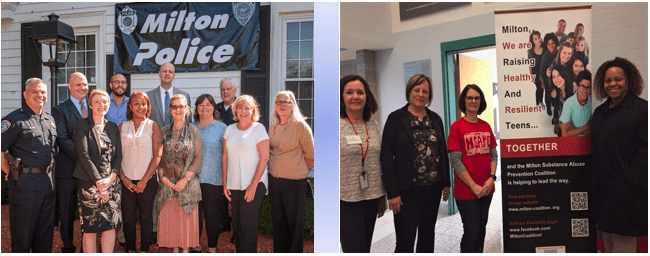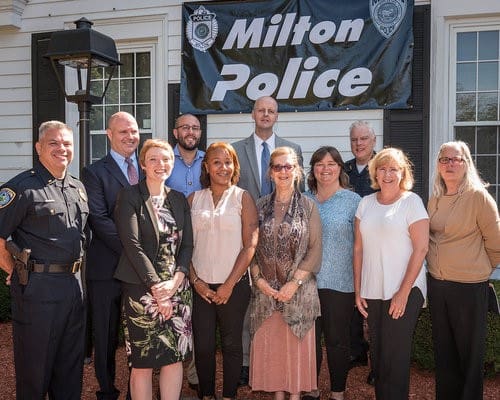
“The Milton Substance Abuse Prevention Coalition (MSAPC) serves the Town of Milton, Massachusetts,” said the coalition’s director Laurie Stillman, “a racially and economically diverse community just south of Boston. Our coalition was formed five years ago, and our focus is on youth substance use prevention. Our youth have high rates of underage drinking and vaping tobacco and marijuana.”
“During the COVID-19 pandemic, we have pivoted to focus much more on using traditional media and social media to educate and reach our audiences, and now we are using virtual platforms to communicate with our coalition members, our Youth Action Team, and the community at large,” said Stillman. “We are publishing full page inserts and advertisements in our two community newspapers, with information, resources and messaging. We have hired a professional communications firm, that specializes in public health messaging, to work with us to create social media campaigns through Facebook, Instagram and Snapchat. This messaging focuses on issues we uncovered in our community assessment: high school youth are getting their alcohol and drugs from their older siblings. We thought this would be an important time to reach out to college students living at home and encourage them to act responsibly and not supply their younger siblings with drugs and alcohol. We are simultaneously reaching parents through social media with messages to reduce youth access by encouraging them to monitor their alcohol and drugs at home, and to speak with their children about their expectations and reward responsible behavior. Moreover, we started ‘boosting’ messages through Facebook. This costs money, but we are reaching a much broader audience by connecting a larger Milton audience to our Facebook page and to our website. Finally, we just purchased Zoom Pro and we are using the webinar feature for our virtual staff meetings and meetings with others.”
“A silver lining to the epidemic is that more people, of all ages, are connecting to the world by social media,” said Stillman. “This allows us to reach a greater audience than we normally reach through our social media campaigns.”
“However right now, due to the crisis caused by the pandemic, it is unrealistic for us to work directly with the major community systems that we have traditionally partnered with, because they are overburdened with the new challenges presented to their organizations by COVID-19,” said Stillman. “The school system (which just was closed down for the remainder of the year), our police department, community hospital and health department (who are responding to health emergencies and contact tracing) are all immersed in the urgency of the pandemic, which is currently surging in our state. So, to respect their needs to be focused on this crisis, our staff is working more independently to stay in touch with the community in other ways—namely through traditional and social media outlets. We are keeping our partners up to date, however, and will be using this time for capacity building with our coalition representatives.”
“We recently hired a youth coordinator who is focused on keeping our Youth Action Team engaged through Zoom Pro,” said Stillman. “Because kids use text messaging and don’t like using email to communicate, we are exploring a few apps that will allow us to do group text messaging with them to keep them engaged.”
“We asked our youth what they would like to do during this time of COVID-19,” said Stillman. “They said that they want to communicate with their peers and document for adults their changed lives now that they are quarantined. They came up with the idea of launching ‘Milton QuaranTEENS’ by producing short videos that would be uploaded on their own YouTube Channel. One of the teens designed a great logo for the project. They are still in the planning phase: we need to get parental permission forms before we post these videos, we are developing a schedule of video posts and we are discussing avenues for getting more Milton teens involved beyond those who are currently engaged with our Youth Action Team. MSAPC also sees this as a great way to recruit more youth to our coalition, because it’s a unique and fun way for teens to connect with one another in creative ways.”
“We have also launched a weekly webinar series called ‘Milton Learns Together,’” said Stillman. “We are very excited about engaging our residents in new ways through this mechanism. Never before has our town sponsored a community-wide webinar, so we expect to garner a lot of publicity and credibility through this effort. Our first program is entitled, “Tweens, Teens and Quarantines” by Jon Mattleman of the national organization Minding Your Mind. The audience for this particular webinar is focused on parents and guardians, to help them support the mental health of their children during the COVID-19 pandemic. We expect to conduct webinars for youth as well.”
“We have cancelled our community programs and moved to online communication strategies,” said Stillman. “Parents are looking for ways to support the behavioral and mental health of their children, because they are sometimes stressed and depressed by being quarantined and unconnected with their peers and regular routines. Parents are eager for support and advice. Most of our work is now focused on this urgent need: the emotional health of their children.”
“Both youth and adults are using social media like never before during this period of quarantine,” said Stillman. “This is an incredible time to reach wider audiences with important prevention messages. Put your efforts and resources into developing clever and engaging messages for adults and youth. Take advantage of their online presence and create online opportunities for connection.”



